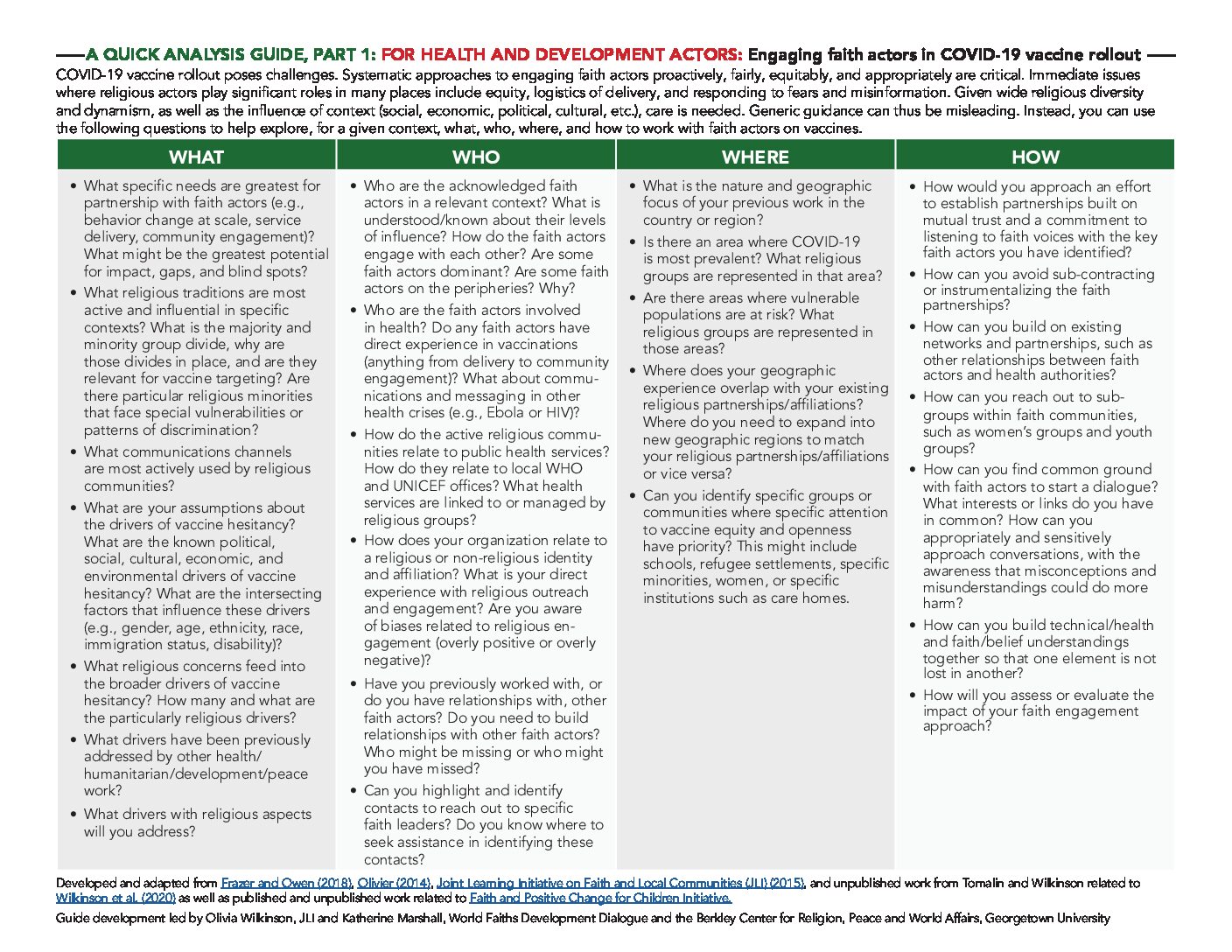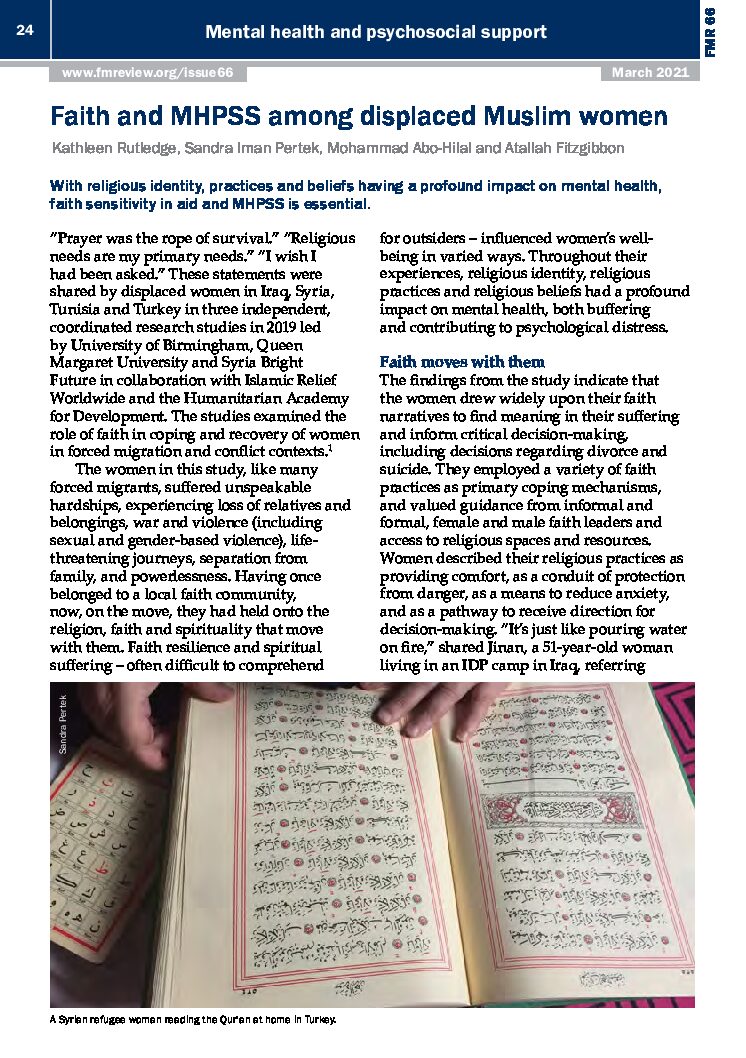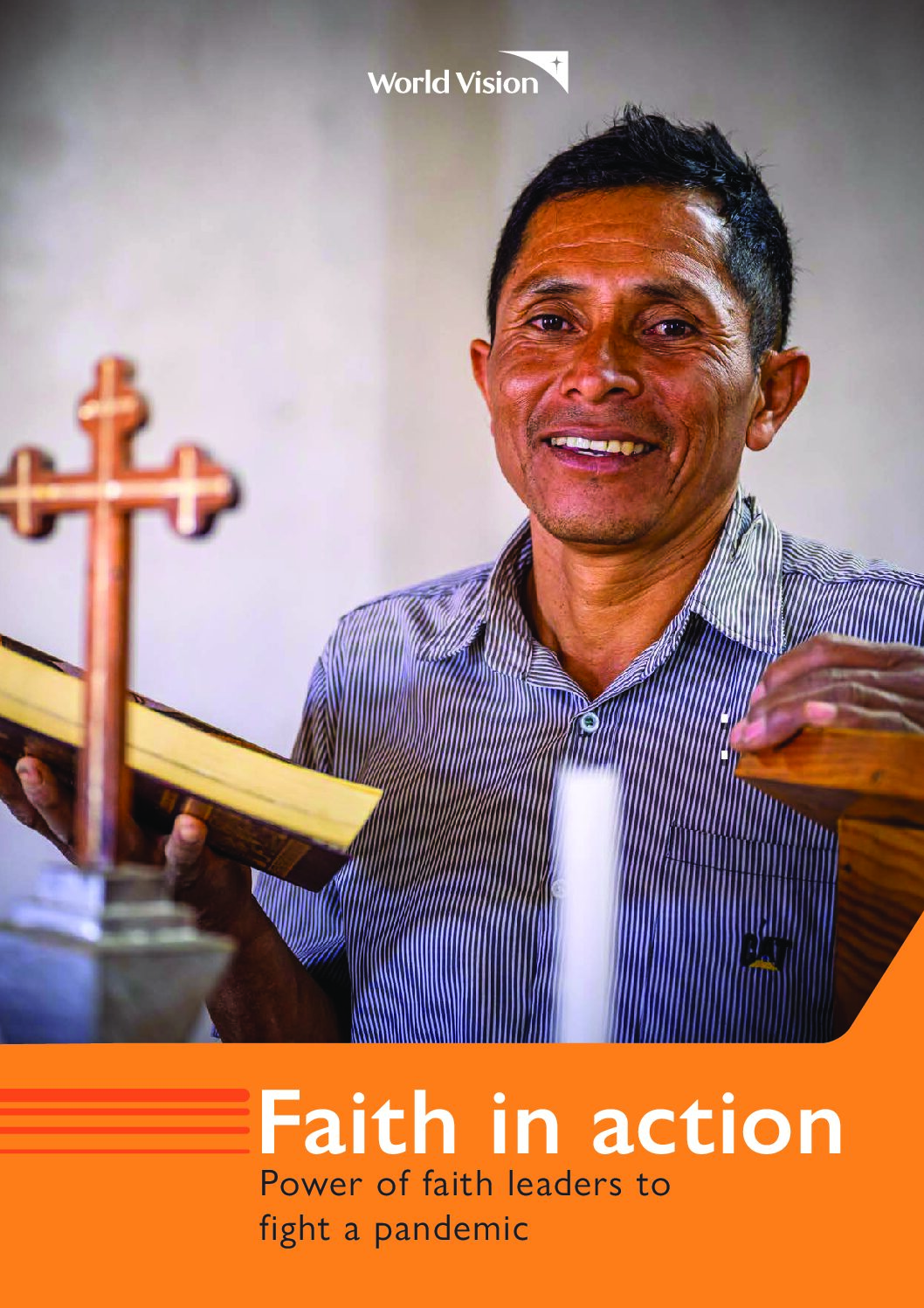Date/Time
Date(s) - 09/11/2022
9:00 am - 10:30 am
Categories
In 2021, the JLI launched its Fair and Equitable Dialogues with a global webinar series on the role of local faith actors in the humanitarian and development fields. The series explored the power dynamics between international and local actors, the challenges of localisation, and concluded with a webinar showcasing local faith actors’ responses to COVID-19 from different regions.
في عام ٢٠٢١، أطلقت مبادرة التعلّم المشتركة سلسلة حوارات العدل والمساواة عبر ندوات عبر الويب حول دور الفاعلين الدينيين المحليين في مجالات العمل الإنساني والتنمية وبناء السلام. استضافت السلسلة عدد من الحوارات حول ديناميكيات القوّة بين الجهات الفاعلة الدولية والمحلية، تحدّيات توطين المساعدات الإنسانية، واستجابة الفاعلين الدينيين المحليين إلى جائحة كورونا في بلاد مختلفة. جمعنا متحدّثون ومتحدّثات من مصر، لبنان، الفلبين، إندونيسيا، الهند، الولايات المتحدّة الأميركية، بريطانيا، جنوب السودان، وغيرها
The new Fair & Equitable Dialogue series will now dive deeper into what fair & equitable joint learning looks like in practice. In early 2022, JLI launched our first three regional learning hubs, in the Middle East, Syria, and East Africa. Each regional hub has embarked on an individual journey of mapping, networking, engagement, and learning with local actors from the region. This series will explore those journeys, and will showcase the challenges, opportunities, successes, and learning that happens when we shift the power.
اليوم نُعلن إطلاق سلسلة حوارات العدل والمساواة الجديدة التي ستركّز على عمل المنظّمة الإقليمي وستتعمّق في رصد وتقييم كيف يمكن تحقيق تعلّم مشترك، عادل ومنصف، على المستوى العملي، وتحديدا من خلال منتديات التعلّم المشترك الإقليمية في الشرق الأوسط وسوريا وشرق أفريقيا. خاض كل منتدى رحلة فردية في تحديد الجهات الفاعلة والتواصل معها والتشبيك والمشاركة والتعلّم. في هذا الحوار، سنغوص أكثر في تلك الرحلات. سوف يعرض القادة المحليين التحديات والفرص والنجاحات والتعلم الذي يحدث عندما نحوّل موازين القوى من المستوى الدولي إلى المستوى المحلّي والإقليمي
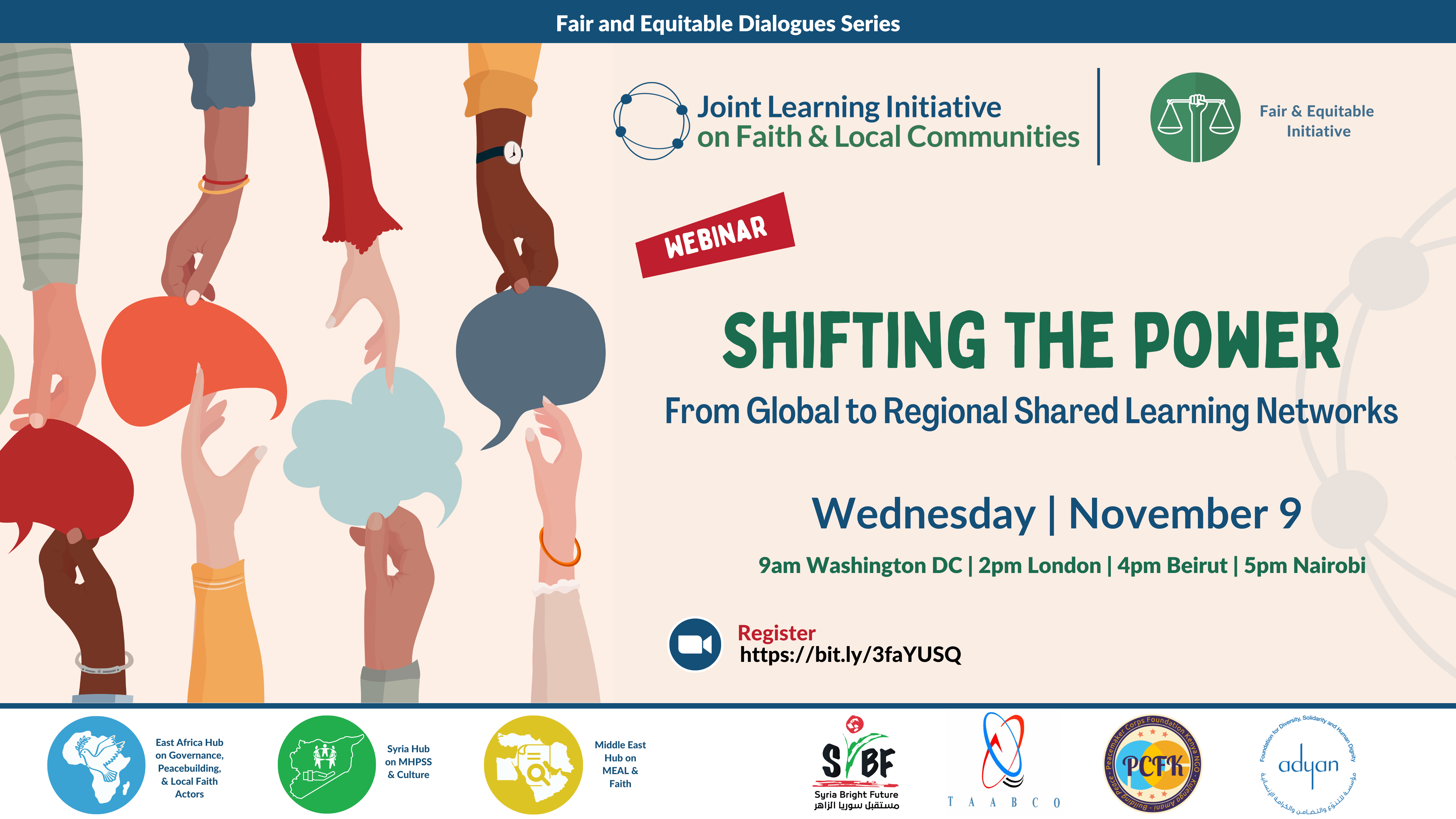
Tune in to the first regional dialogue, “Shifting the Power: From Global to Regional Shared Learning Networks”, and listen to speakers from Lebanon, Syria, Kenya, and the UK.
Join us and click here to register
Note: The discussion will be in English & Arabic with simultaneous translation to English & Arabic.
سيكون النقاش باللغتين الإنجليزية والعربية مع ترجمة فورية إلى اللغتين
Moderator:
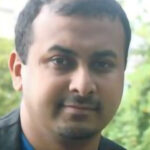
Amjad Mohamed-Saleem
Amjad Mohamed-Saleem is a political analyst and freelance consultant with interests in Peace Building & Humanitarian Policy; South Asia and Interfaith Action. He has worked with International Alert, KAICIID, the Commonwealth Foundation,Islamic Development Bank, The Cordoba Foundation, Muslim Aid among others. He sat as a thematic advisor for the UN initiated process, the World Humanitarian Summit (WHS) looking at ‘Meeting the needs of People in Conflict’ for the UN initiated process, the World Humanitarian Summit (WHS) and an advisor for the WHS work streams on ‘Islamic Social Finance’ and ‘Religious Engagement in Humanitarian Work’. He is a regular contributor to Huffington Post and State of Formation and also to academic journals. He has also published a book on the Aceh Peace Process and contributed chapters to ‘The World of Prayer’, ‘Cosmopolitanism, Religion and the Public Sphere’, ‘Muslim Minority – State Relations: Violence, Integration and Policy’, the Commonwealth Heads of Government Meeting 2015 Report and the CIVICUS “2015 State of Civil Society’ Report. He has an M.Eng from Imperial College, an MBA from U21 Global Singapore and is currently pursuing a part time PhD at Exeter University.
Speakers:
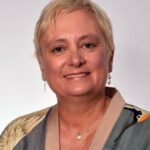 Emma Tomalin, Professor of Religion and Public Life, University of Leeds, UK
Emma Tomalin, Professor of Religion and Public Life, University of Leeds, UK
Professor Emma is a sociologist of religion/religious studies scholar whose work is focused on the broad area of religion and public life. She has a long-standing interest in religions and global development, including the gender dimensions of this relationship. More recently, she has been involved in projects that also engage with the role of faith actors in humanitarian action, peacebuilding, and health. She has mainly worked in South and South East Asia, and more recently East Africa. Closer to home, she has carried out research on the role of faith actors in public life in the UK, in terms of the anti-trafficking and modern slavery domain as well as the relevance of local faith communities to public health. Her latest book has just been published, The Routledge Handbook on Religion, Gender and Society (2022), edited with Caroline Starkey.
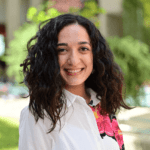
Ana Maria Daou
As a Chevening scholar, Ana Maria completed her M.A in Conflict Resolution in Divided Societies at King’s College, London. Her thesis, entitled “Know Thy Neighbour: Interfaith Dialogue, Peacebuilding and Reconciliation in the Lebanese Context” explored the role of practical interfaith dialogue in the Lebanese peacebuilding and reconciliation process, and received academic praise. Valedictorian of the Faculty of Humanities, she also graduated with a B.A., Summa Cum Laude, in Communication Arts and a B.A. in Translation and Modern Languages. She is currently the Research and E-Learning Manager at Adyan and the Deputy Coordinator of the International Youth Committee at Religions for Peace. Her scope of work focuses on the organization’s projects on pluralism, dialogue, inclusion, education, and faith-based activism in the MENA region and beyond. Daou has also co-authored book chapters, journal articles and reports on topics of inter-religious dialogue, peace-building, and sustainable development. Last but not least, she participated as a trainer and speaker in several workshops and conferences in Lebanon and abroad. Ana Maria is the co-chair of the Middle East Hub on MEAL and Faith.
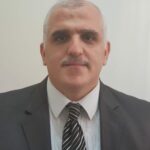
Mohammad Abo-Hilal, M.D.
Dr Mohammad Abo Hilal is a Syrian psychiatrist, trainer and supervisor in the field of mental health & psychosocial support (MHPSS) and protection. He is the Founder of Syria Bright Future – a Syrian organization specialized in MHPSS and protection. He is also a co- founder of other NGOs that work in the Syrian context on MHPSS, women protection, and youth empowerment. Over the last ten years, Dr Mohammad designed and supervised several MHPSS programs and projects that supported Syrians inside Syria and in neighboring countries. Dr Mohammad is the co-chair of JLI’s Middle East Learning Hub on MEAL and Faith and leads on the Syria Learning Hub on MHPSS and Culture.
Dr Mohammad authored and co-authored several research papers on Syrians’ mental health including an article on “Syrian mental health professionals as refugees in Jordan: establishing mental health services for fellow refugees”.
Dr Mohammad has a special interest in adapting the MHPSS curriculums to Syrian culture and building the capacity of youth-led and grassroots organizations.
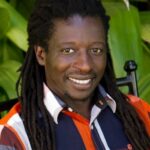
Fredrick Ogenga
Prof. Fredrick Ogenga; Associate Professor, Media and Security Studies at Rongo University and the Founding Director Center for Media, Democracy, Peace and Security, Rongo University. He is also The President and CEO of the Peacemakers Corps Foundation Kenya, a local NGO that is a member of Alliance for Peacebuilding that uses technology to build peace, working with the youth. Ogenga is a 2014 Africa Peacebuilding Network Grantee and 2016 Southern Voices Network for Peacebuilding Scholar, Washington DC. He is a former Visiting Researcher at the African Studies Center, Frederick S. Pardee School of Global Studies, Boston University, USA and Institute of Policy Research, University of Bath, UK. He was a post-doctoral fellow at the University of Witwatersrand, South Africa. Ogenga is widely published in the area of media, peace and security. Currently, he is championing African Peace Journalism through a Pan-African institutional methodological and philosophical approach to media and peacebuilding in Africa anchored on the philosophies of Utu or humanity, Umoja or Unity and Harambee or collective responsibility captured in his latest edited book “Peace Journalism in East Africa- A Manual for Media Practitioners” published by Routledge. He has developed a new MSc and PhD program in Media and Security Studies at Rongo University through the Center for Media Democracy, Peace and Security. Ogenga is currently a Letsema Visiting Fellow at the Institute of Pan-Africa Thought and Conversation at the University of Johannesburg, South Africa and Academic Co-chair, East Africa Hub Joint Learning Initiative (JLI)
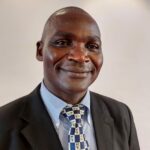
John Okanga
Mr. John Okanga, the Chief Executive Officer of TAABCO is a Development Economist and holds an M.A. in Peace and Conflict Management. He has wide experience with participatory community development processes and tools such as Participatory Action for Community Enhancement (PACE); rights based approaches (RBAs), Do No Harm (DNH), Participatory Integrated Community Development (PICD). He has conducted extensive training for community representatives, local and International development and relief organizations and policy makers on: peace-building and conflict mitigation, conflict sensitive programming/Do No Harm, prevention of violent extremism, social justice, youth empowerment and livelihoods improvement. He has conducted program evaluations, documenting best practices and baseline surveys in Kenya, Uganda, South Sudan, Sudan, Liberia, Sierra Leone and Tanzania. Mr. Okanga also has extensive experience working on peace building and conflict mitigation and governance with the urban poor, mainly in Nairobi’s informal settlements, where he together with other project team members, working for Global Communities, an American international non-governmental organization, delivered a successful conflict mitigation and prevention of violent extremism project funded by the United States Agency for International Development (USAID) that contributed largely to relatively peaceful elections of 2013 and 2017 and improved working relations between community youth and state security institutions including the police and Government administrators. He has been part of a 9-member taskforce of the global Conflict Sensitivity Community Hub (CSC-Hub) that developed an open letter that carries four point advisory on policy concerns in the wake of CoronaVirus Disease 2019 (Covid-19).

